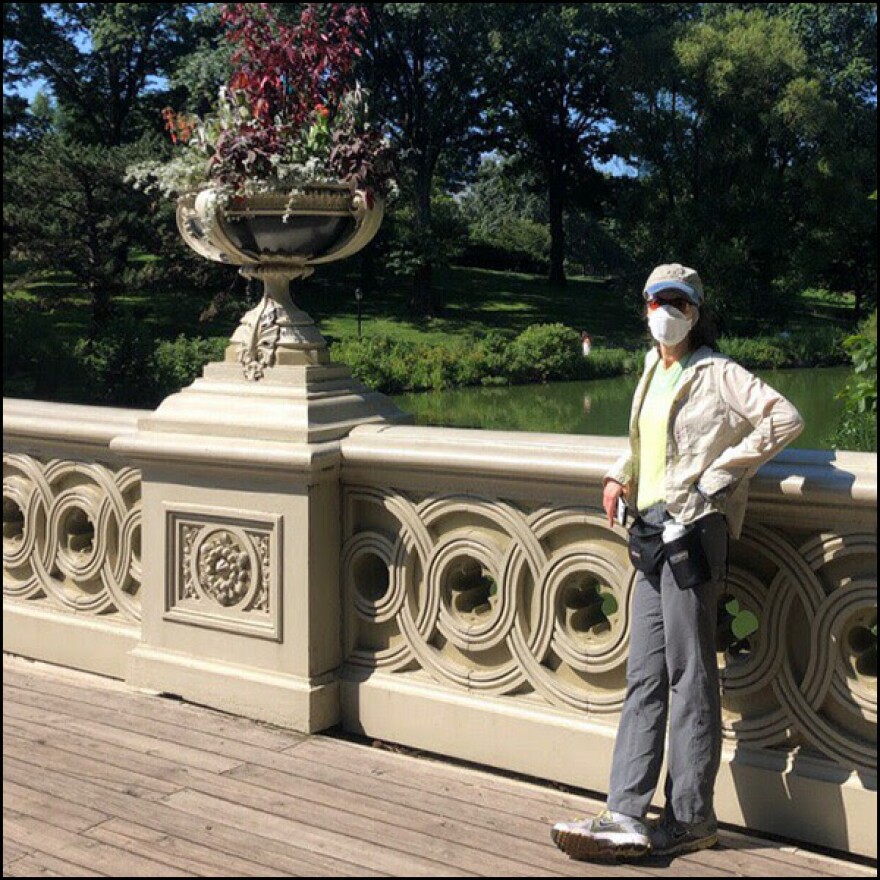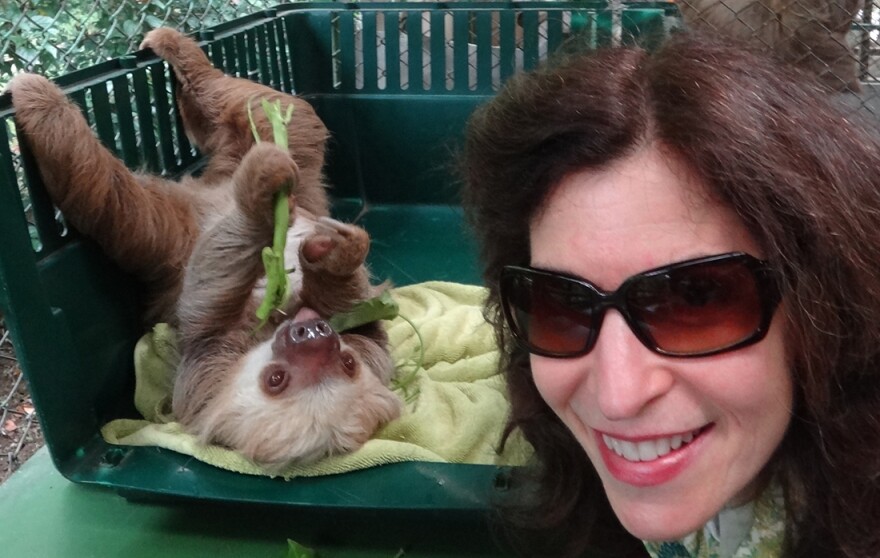What is multiple Grammy-winning classical guitarist Sharon Isbin's response to everyone wearing masks to stay healthy? "Welcome to my world!" she says. "I’ve been wearing an N95 mask for almost 20 years on every single airplane flight, and since doing that, I've never gotten sick from flying."
In this TIME IN interview, Sharon talks about navigating the pandemic with more healthy habits, including Transcendental Meditation, and learning the technology to create new ways (beyond Zoom) of teaching her guitar students at Juilliard, where she directs the department she founded in 1989.
As a young girl, Sharon dreamed of becoming a rocket scientist, then channeled her curiosity, talent, and pioneering spirit into music. With over 80 commissions from leading composers, soloist performances with nearly 200 orchestras, and collaborations with musicians of different genres, she's demonstrated the expansive musical range and virtuosic nature of the classical guitar and taken it to new audiences all over the world.

Here she is with Mark Holloway from the Pacifica Quartet chatting with Justice Ruth Bader Ginsberg after a performance in Chicago, in 2019. Justice Ginsburg is admiring their CD, Souvenirs of Spain and Italy.
And in a poetic twist, the music of this rocket-lover made its way into space when her album, American Landscapes, was aboard the Space Shuttle Atlantis in 1995.

Sharon performed for President Barack Obama, his family, and guests at the White House in November, 2009, during a special evening of classical music performances. Here she is playing Isaac Albeniz's Asturias and Agustin Barrios Mangoré's Waltz Op. 8, No. 4.
Her life, naturally, has involved a lot of travel and performing, and trying to stay healthy to do her best on stage. "I started [wearing a mask] about 17 years ago, when SARS 1 became an issue," she says, "And I discovered that it just kept me healthy all the time."
Sharon met with me on Zoom on September 22nd, 2020 to talk about life during the panedemic. Here are edited excerpts from our conversation:
Where were you when everything started to shut down this year in March?
Fortunately, I was [at home] in New York City. I wasn’t trying to scramble back from another country or city. I was right here.
You’ve worn masks for years, and stayed healthy, despite your travel schedule. What other kinds of habits help you stay healthy?
It's also important to value other things like meditation. I've been practicing Transcendental Meditation since I was 17. It's a fantastic way to release stress so that you're not encumbered by it, and to access your own inner core, your own creativity. It really helps, in my case, as a musician, for focus, mental stamina, creativity, all of those things, and it's something I recommend for anybody.
At a time when we're all going through the challenges of, and just the horrific consequences of, a pandemic in this country and in the world, TM is a wonderful way to keep your balance and your focus, your inner strength, and your health.
Do you have a meditation routine?
Yes, and it's not anything I've invented. It's a practice from India that's many thousands of yeasr old. Actually, that was one of the reasons I was very excited to visit India in February of 2019, when I was invited to tour with Amjad Ali Khan and his sons [collaborators on her album—to see the country that brought me a technique that I started when I was 17, and that has been such an important part of my life.

So you meditate in the morning when you get up, before you eat, so that your digestion is not interfering with the process of relaxation. And so 20 minutes, in a chair, no fancy position. I put ear plugs in, that's it. And then in the afternoon, the same story. And I just feel like it has given me twice as much life because it is so powerfully rejuvenative.
You have other healthy habits, too.
I'm very fortunate that I live just one block from the Hudson River in New York City in the Lincoln Center area [near Central Park] and I just pop out the door and I can go jogging for miles on the river. Exercise is a great way to not only to stay fit, but to stay mentally healthy.

And I'm vegetarian. I do organic only, and being home has given me the opportunity to do that 100%, as opposed to whatever may happen on the road.
And all of that I think is a way to be able to make yourself more useful to society. Because if you take care of yourself, you're better able to take care of others as well.
So you have been doing things pre-pandemic that nurture and take care of yourself: the meditation, the jogging, the eating vegetarian and organic. Since the pandemic has shut everything down, how has your life changed? Has your approach to those things changed?
My approach has changed only in that I'm not going out to restaurants. I'm doing all my own cooking, which gets kind of boring after a while, but that's the way it is. At least it’s really healthy.
I used to have maybe a glass of wine once a month. Now I don't even touch this stuff, because I don't want anything to interfere with the immune system. It has also meant that I'm off sugar. I just want to maintain peak health on every possible level.
And so I feel completely revitalized and I'm getting a lot more sleep than I used to get when I was constantly packing and going on the road. So on some level, this terrible pandemic has given me a chance to have the kind of respite from travel that I've never had in my life, not since I left college. It's something that I can actually cherish—that part of it—to be able to get eight hours of sleep. That's going to stay with me. I'm not giving that up.
Any other discoveries you've made about things you want to continue after the pandemic?
Well, I've added a bunch more miles to my running. I had to catch up on my taxes, and I did it all in the space of a month and a half. I had to jog five miles [to deliver the papers] each time because I won't take any public transportation during a pandemic. And I discovered, wow, I can do that! I normally had been doing two-and-a-half or three.
And I just feel more fit than I've ever been in my life, which is saying a lot. But I think just when you have to rely on yourself to be informed, informed politically, informed about health, all of those things, you can just get stronger in a variety of different ways.
Has there been any music or videos or film or books that you've turned to?
I wish I could say that I've had time to watch movies, but I've been so busy with the release of two albums [Affinity and Strings of Peace] at the same time, which is kind of nuts in itself ... I've really had to focus on things like that. I’m also getting a publication ready of the Joan Baez Suite by John Duarte, long overdue, that's going to be published in January. My fingerings, all of that, had to be edited. There were a lot of things that were on the shelf I never had time to do, that I'm now able to focus on.
Once I have tutored myself in video—which I know nothing about and I'm learning on my own—I think I'll have more time to watch movies and listen to more music. I'm always listening to new composers. I'm always interested to explore things, either written for guitar, or not written for guitar.
So you've been learning new technology?
Working with my students at Julliard was [at first] a challenge, because obviously there is no in-person at Julliard right now. I didn't want to do this on Zoom. So I decided to try a different approach.
They would create an audio recording of themselves playing whatever the pieces that we're going to work on. They would send me a PDF with all the measure numbers notated for each line on the left margin. And I would become their own personal recording producer. I would listen as if I were in a studio, critiquing them, with the same standards that I would on my own recording. And the result has been absolutely phenomenal, because we have no visual distractions. Everybody's focused on listening, refining it to the highest possible level.
I'm just stunned by the result of all of this. This is a new kind of revolutionary teaching technique I've never done before, but it's proving to be very valuable for me.
Well, you might continue it after the pandemic, alongside your in-person work?
I think I may have to because it's just too good to not use!
Also I noticed photos of animals on your website.
Yes, I love animals. One of my cosmic experiences was just about four years ago, going back to Costa Rica. I think it was my third trip there, going to an orphan baby sloth preserve. This was after performing with the Costa Rica Symphony. It was a challenging trip to get to this place in the orphan baby sloth preserve. But wow, what an experience!

I got to pet one of them—her name was Millie—on her little belly. And as I did that, she looked into my eyes and then with her two sloths claws, which are her fingers, she took my hand in her hand and held it, and looked into my eyes. I thought I'd gone to heaven. That was just the most beautiful, magical experience. I will always cherish that.
That's great. Thanks for sharing your thoughts with us during this strange time. And you've released two albums during this pandemic?
Yes. Strings for Peace, which has world premieres for guitar and sarod; the sarod being an instrument from India played by master Amjad Ali Khan and his sons Amaan and Ayaaan Ali Bangash. These are ragas that Amjad wrote for us, and this is just absolutely gorgeous music—something that connects to another sphere and that is relaxing and exploring and beautiful and mesmerizing.
And the other album is Affinity, which are premieres from composers from three different continents.
Thanks so much, Sharon. It's been wonderful to talk to you.
Thank you, Susan.
I hope to see you in person sometime soon.
I do, too. Thanks a lot. And I hope all of your listeners stay healthy and well and strong.


